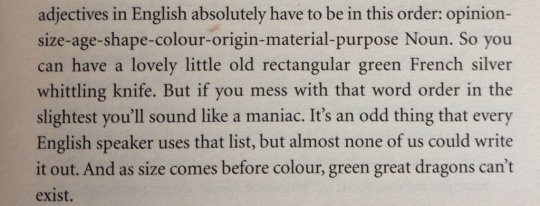Text
Who wants to take a quick quiz and test your knowledge of Russian verbal prefixes?
In this quiz, you will be presented with different Russian verbs and asked to identify their verbal prefixes. Not a big deal, right?
Let me know what score you've got!
15 notes
·
View notes
Text

Look what a treasure I got! I recently received a book titled "Why Russian Aspectual Prefixes Aren’t Empty", written by a group of authors led by Laura A. Janda, who is a Professor of Russian Linguistics at UiT the Arctic University of Norway.
I'm really looking forward to delving into this topic of Russian verbal prefixes, which never ceases to fascinate me - even though I'm a linguist and a native Russian speaker myself. I'm sure I'll gain many insights and hours of engaging reading from this book.
Additionally, I wanted to remind you about my online workshop on Russian verbal prefixes, taking place next week on April 19 at 7 PM Eastern Time. Tickets are available here. During the workshop, I'll be discussing how prefixes work, how they modify verbs, and why they're actually a big help - not a curse - for Russian learners. I hope to see you all next Wednesday!
45 notes
·
View notes
Text
Vocabulary Lists Masterpost
Some expressions posts
Some expressions: ears
Some expressions: eyes
Some expressions: nose
Some expressions: hands
Some expressions: head
Other phraseology
Some Russian idioms & proverbs
Russian “national” expressions
Expressions with names
Biblical expressions
Thematic
Birthday vocabulary
Scary adult stuff (Russian + French)
The Brothers Karamazov vocabulary
Apologies
Interjections
Gestures
Russian equivalents to popular English colloquial expressions
What do Russian animals say?
Misc
A guide to different “what-s”
Nonsense
Conversational
315 notes
·
View notes
Video
youtube
пасаны чё нашла
neznaika on the moon with english subs (the book fucked me up as a kid)
169 notes
·
View notes
Link
To escape from a hot tropical place Shuleykin (Evgeni Leonov) accepts a position on a ship looking after a cargo of twelve cages with tigers. Chief mate , played by Ivan Dmitriyev) has continuous arguments with Marianna (Margarita Nazarova) about the little tricks she plays on the crew. One day a stowaway monkey opens the cages and the limited capabilities of Shuleykin get exposed. In this situation Marianna unexpectedly turns into a skilled animal trainer.
197 notes
·
View notes
Note
Hi! Just wanted to say thank you SO MUCH for sharing that 2000 word anki deck with us. I think I finally feel inspired to learn Russian. You have no idea how much it helps. Also, your voice is so beautiful 💖
aaaa sorry i didn't see this earlier!
i'm really glad it helps people, it was really fun to work on the decks 👀 thank you for using it!
#i'm almost out of college so hopefully as soon as i get a job i'll get to work on more things#i kinda wanna move out and try more stuff with my half dead yt channel? hmhmhmm#and i read all the reblog tags they make me so!! giddy sgsjhdkfjk#i feel complete haha#thank you <33
2 notes
·
View notes
Text

Kristina Malidovskaya recently revamped her entire News in Slow Russian Course. Promising to overhaul the system & to bring in better audio and fresh articles for students. This is something I’ve been interested in for a while, but originally the price put me off. She has since updated the price since I’ve joined, increasing it to $297 (or 4 monthly payments of $87).
The concept is very simple: she breaks down articles into something geared towards upper-beginner, intermediate, and advanced learners. Allowing them to develop their vocabulary in culturally relevant topics such as politics, sports, celebrity news, scientific breakthroughs, and so on. Each article is bitesize and comes with a ‘Slow Russian’ audio and a ‘Normal/Fast Russian’ audio. There’s interactive transcripts that provide translations for some trickier vocabulary and phrases.
Kristina has a Youtube channel over at ’Boost Your Russian’ where she uses things like political speeches, films, articles, and other resources to develop her viewers vocabulary and grammar. Initially she breaks the piece down, going over it in a slow pace, and providing cultural points before then reading it at a normal pace.
She has put up videos covering some of the articles that are going to be in her course, so it could be a good way to get a feel for if any of this content interests you:
Икеа создала мебель для геймеров
“худой” дом в Лондоне

One thing that really appeals to me with the site is that there’s content for upper-beginners, intermediate, and more advanced students. I’ve personally found that it can be quite difficult to find accessible reading material that caters towards more beginner audiences that isn’t boring. Also with someone with an interest in politics, the news, and so on it’s nice to be able to theoretically engage with that kind of content.

I also do really like how it doesn’t just provide singular word translations, but also translations for phrases (which can often be very awkward to check with a translator). It can really help to relieve that uncertainty, I can comfortably know that I’m getting the right understanding of a phrase.
I’ve decided that for every day of March, I’m going to really dedicate myself to working with the program each day of March to give as thorough of a review with it as I can. I personally really don’t find it helpful when someone provides reviews on resources that they’ve used for just a couple of hours or days. I don’t think it’s enough time to really adjust to a program, and to get a good feel for its strengths and weaknesses.
If you’re interested in checking it out for yourself or purchasing it, then consider checking it out through my affiliate link. I will receive a very small commission, but it’ll be at no extra cost to you. Having an affiliate link will in no way affect my review of the product. It’s something that I bought with my own money, and therefore I’m going to actually want it to be worth it. I’ll do weekly check ins to write about how I’m approaching the resource (both to be transparent about me actually using it, and to give ideas on study methods for anyone considering using it), and to see how I feel along the journey.
If you already have purchased News in Slow Russian, then I’d love to hear your thoughts and strategies for using the resource!
19 notes
·
View notes
Text
Dealing With Executive Dysfunction - A Masterpost
The “getting it done in an unconventional way” method.
The “it’s not cheating to do it the easy way” method.
The “fuck what you’re supposed to do” method.
The “get stuff done while you wait” method.
The “you don’t have to do everything at once” method.
The “it doesn’t have to be permanent to be helpful” method.
The “break the task into smaller steps” method.
The “treat yourself like a pet” method.
The “it doesn’t have to be all or nothing” method.
The “put on a persona” method.
The “act like you’re filming a tutorial” method.
The “you don’t have to do it perfectly” method.
The “wait for a trigger” method.
The “do it for your future self” method.
The “might as well” method.
The “when self discipline doesn’t cut it” method.
The “taking care of yourself to take care of your pet” method.
The “make it easy” method.
The “junebugging” method.
The “just show up” method.
The “accept when you need help” method.
The “make it into a game” method.
The “everything worth doing is worth doing poorly” method.
The “trick yourself” method.
The “break it into even smaller steps” method.
The “let go of should” method.
The “your body is an animal you have to take care of” method.
The “fork theory” method.
The “effectivity over aesthetics” method.
195K notes
·
View notes
Photo

things english speakers know, but don’t know we know.
507K notes
·
View notes
Text
how to study with a mental illness!!!! aka a guide to simultaneously caring for yourself and your academics
(disclaimer: this is from purely personal experience and is not a substitute for seeking professional help. these are just personal tips as i was formally diagnosed with depression and anxiety in the third year of college, but had been showing symptoms even in high school. different methods help for different people, but i really hope some of these things can help a struggling student out, because one of the reasons i went on studyblr in the first place was that i felt really lost and anxious.)
1. done is better than none. sometimes an assignment you have to turn in would be objectively easy to complete, but it takes longer to do so because you’re afraid that the final product won’t be as good as you want it to be, or as good as a professor expects it to be. it’s hard to remove those expectations, but it is a little easier when you remember that getting some points (no matter how many they are) are better than getting a deduction for late submissions or not turning in the project at all. many people – including myself – suffer from perfectionism in university, but it is overall more important to complete something to the best of your own ability, and learn from the feedback on the project later on. more importantly, often, you’re doing better than you think you’re doing, so surprise yourself. you can do it. just start. 2. keep careful track of your deadlines. much of my undergrad anxiety came from the fact that i knew something was due, but couldn’t keep track of it, or didn’t want to confront it. it’s better to confront it because you have more time to do it slowly and thoroughly. as soon as you hear about an impending exam or paper deadline, keep track of it. personally, i use google calendar. from there, you can make smaller plans and break down your goals to make it more doable! 3. don’t be afraid to ask for help. there used to be a huge stigma against mental illness, but thankfully, many educational institutions are much kinder and more considerate about it. if you really can’t meet a deadline or come to class, let your professor know. most professors are kind, reasonable people who genuinely care about you and your well-being. even one of my scariest professors granted extensions to a girl who was genuinely struggling with serious depression, and the college of law i’m in takes mental health very seriously to the point that they instruct faculty how to deal with such cases. if you’re not able to talk to a professor, try to ask help from a classmate or a friend who can share notes or fill you in on how they accomplished a certain assignment. many people will be happy to help. you are not a burden, love. 4. be kinder to yourself. mental illness is like any illness. it often keeps us from doing as well as we’d like to be because it’s a genuine and serious health problem. sometimes it helps to keep this in mind when we flub a report in class (as i did several tens of times in undergrad), get a bad score, say something ridiculous during recitation, or mess up a paper. it’s okay to do your best while you heal. you know you’re trying your best, and slow growth is still growth. 5. on that note, care for your other needs. one of my happiest and most fulfilled semesters (even though it was my busiest) was when i had time to see a psychiatrist, run, pack lunches and fruit to school to eat healthy, and have a reasonable-ish sleep schedule. this was during my thesis semester. while i had to take an incomplete, and finish my thesis the next sem, because i was attending to my own needs, i felt like a living, breathing, learning, happy person. and i finished my thesis the next semester. it’s better to look after your own physical health and needs before your academics. 6. sometimes, it’s better to do nothing and rest. you deserve it. part of the reason i’d been doing horribly in law school was that i didn’t sleep and it was making me mildly unbalanced and incredibly suicidal; not to mention the fact that i wasn’t really retaining any information or performing well. rest days are just as important as days when you study because rest IS productivity. 7. take your meds. see your psych or therapist if you have one. avail yourself of mental health services on campus if there are any. these genuinely saved my life at a time that i thought i was beyond saving. please go seek help if you can. BONUS: MY STUDY SETUP ON A TERRIBLE MENTAL HEALTH DAY (like today) - i try to clear the space and clean up as much as possible. it makes me feel like i have things under control, and have my work things where i can see them. - i eat something healthy, like fruit, and get a lot of water. i keep a water jug on my desk because it clears my thoughts and helps me replenish the fluids lost from crying (1/2jk). it also really keeps up my strength for the study process. - i turn on a calming playlist, like a jazz or lofi or ghibli playlist. in another window, i turn on a rain sound video on a softer volume, and it helps center me. - it helps when you have a soft or calming scent to calm you down. i use a lavender room spray, and it makes me feel cozy and productive, but in undergrad, i used this tea-tree lavender mix and it smelled like sunny afternoons and guitar coffeshop playlists. it really is nice. - there are breathing exercises and gifs all over the internet. they help calm you down when things seem Too Much. i really hope this helps, guys. don’t hesitate to message me if you’ve been having a hard time with school or life or anything. please, please care for yourselves. you can do it. – sam
11K notes
·
View notes
Text
i mean like, russian-english vocabulary lists/other challenges or maybe some minor research to post about
anybody got post suggestions for after i’m done with a couple things at college after 24th
1 note
·
View note
Text
anybody got post suggestions for after i’m done with a couple things at college after 24th
1 note
·
View note
Text
“you can’t forget your mother tongue” okay but have you considered bilinguals and polyglots whose first language isn’t english and whose development during adolescence was shaped by consuming content and media only in english and have ever since viewed that second language, foreign to their own, as a better outlet for their emotions and thoughts? as Yiyun Li said “it is hard to feel in an adopted language, yet impossible in my native language.”
#also consider: consuming media in english purposefully to forget native language bc it was used in negative light only#general tag
50K notes
·
View notes
Text
Archive.org is facing a lawsuit



tldr: the Internet Archive/WayBack Machine is super important in term of archived content, billions of stuff are on there, and with the current event happening in the world like stated above,without this tool, it will be hard to properly document what took place. It will be easy for certain people to rewrite history. Dont let them.
DONATE HERE (post dont get much exposure with working links sorry)
archive.org/donate/
^^^^^^^^^^^^^
IF YOU CANT DONATE THEN PLEASE SPREAD THE INFO
On twitter,tumblr,facebook,heck,anywhere you want,this needs to be talked about !
173K notes
·
View notes
Text
God making me:

#thanks executive dysfunction#skdgfhsdf.....#btw it's ok!! i've been learning and using english for like 11years and i'm still bad at it#i just randomly checked ur blog idk if i saw it before or if you read tags but um anyway-#good luck with your studies!!#general tag
583 notes
·
View notes
Text

for everyone to think that native speaker you are in russian just words put in sentences in any place absolutely
#i literally read through it and my brain assumed everything about this and ignored the sentence order!!#what kind of sorcery is this......#but like just make sure your grammar is in check and then shuffle and you're good 👌#russian langblr#?
204 notes
·
View notes
Text
One of my favorite linguistic phenomena is rebracketing, which is when a word or words is/are redivided differently, either two words becoming one, one word heard as two, or part of one word interpreted as part of the other. This frequently happens with articles, for example:
apron was originally napron, but “a napron” was interpreted as “an apron”
newt comes from ewt by the same process
In the opposite direction, nickname comes from Middle English nekename which in turn came from ekename (an ekename -> a nekename) where “eke” was an old word meaning “also” or “additional” (so basically “an additional name���)
ammunition comes from an obsolete dialectal French amunition, which came from munition, the phrase la munition being heard as l’amunition.
the nickname Ned comes from Ed, via “mine Ed” being heard as “my Ned” (in archaic English, “my” and “mine” had the same relationship as “a” and “an”), same with several other nicknames like Nell
The word “orange” ulimately derives from the Arabic nāranj, via French “orange”, the n being lost via a similar process involving the indefinite article, e.g., something like French “une norange” becoming “une orange” (it’s unclear which specific Romance language it first happened in)
in the Southern US at least (not sure about elsewhere), “another” is often analyzed as “a nother”, hence the phrase “a whole nother”
omelet has a whole series of interesting changes; it comes from French omelette, earlier alemette (swapping around the /l/ and /m/), from alemelle from an earlier lemelle (la lemelle -> l’alemelle)
Related to this, sometimes two words, especially when borrowed into another language, will be taken as one. Numerous words were borrowed from Arabic with the definite article al- attached to them. Spanish el lagarto became English alligator. An interesting twist is admiral, earlier amiral (the d probably got in there from the influence of words like “administer”) from Arabic amir al- (lord of the ___), particularly the phrase amir al-bahr, literally “lord of the sea”.
Sometimes the opposite happens. A foreign word will look like two words, or like a word with an affix. For example, the Arabic kitaab (book) was borrowed into Swahili as kitabu. ki- happens to be the singular form of one of the Swahili genders, and so it was interpreted as ki-tabu. To form the plural of that gender, you replace ki- with vi-, thus, “books” in Swahili is vitabu. The Greek name Alexander became, in Arabic, Iskander, with the initial al- heard as the article al-.
Similarly, the English word Cherry came from Old Norman French cherise, with the s on the end interpreted as the plural -s. Interestingly enough, that word came from Vulgar Latin ceresia, a feminine singular noun, but originally the plural of the neuter noun ceresium! So a Latin plural was reinterpreted as a singular in Vulgar Latin, which in turn was interpreted as a plural when borrowed into English!
The English suffix -burger used with various foods (e.g., cheeseburger, or more informally chickenburger, etc.) was misanlyzed from Hamburger as Ham-burger, itself from the city of Hamburg
This can happen even with native words. Modern French once is used for the snow leopard, but originally meant “lynx”. In Old French, it was lonce (ultimately from the same source as lynx), which was reinterpreted as l’once! In English, the word “pea” was originally “pease”, but that looked like it had the plural -s on it, and so the word “pea” was created from it. Likewise, the adjective lone came from alone, heard as “a lone”, but alone itself came originally from all one.
55K notes
·
View notes